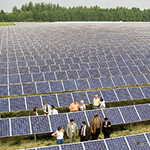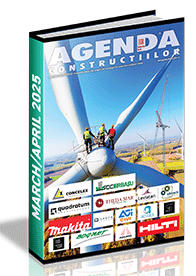| Renewable energy sector could draw foreign investors |
| English Section 11 Iul 2012 08:00 |
 According to the latest research carried out by the experts of the consultancy and audit company Ernst & Young (E&Y), called "2012 European Attractiveness Survey", Romania ranks sixth in the top chart of the most attractive European countries for foreign investors. As part of the study, responses were analyzed in terms of investment intentions for the next three years, expressed by the most significant 840 business men in this sector. Thus, our country was only outranked by Germany (ranking first in the top chart, as expected), Poland, Great Britain, the Russian Federation and France, outrunning countries like the Czech Republic, Turkey, Switzerland, the Netherlands, Italy, Spain or Sweden. "Romania has the advantage of a promising Gross Domestic Product (GDP) rate growth as against the European average and a valuable human capital. Thus, we notice that ever more foreign investors are drawn by the renewable energy sector, which will become the main economic growth driver. Several privatizations are planned for the near future, encouraging investors around the world to turn their attention to our country. It is crucial to stimulate this positive evolution through adequate economic strategies", as stated in a press release by Bogdan Ion, Country Managing Partner for Ernst & Young Romania. According to the latest research carried out by the experts of the consultancy and audit company Ernst & Young (E&Y), called "2012 European Attractiveness Survey", Romania ranks sixth in the top chart of the most attractive European countries for foreign investors. As part of the study, responses were analyzed in terms of investment intentions for the next three years, expressed by the most significant 840 business men in this sector. Thus, our country was only outranked by Germany (ranking first in the top chart, as expected), Poland, Great Britain, the Russian Federation and France, outrunning countries like the Czech Republic, Turkey, Switzerland, the Netherlands, Italy, Spain or Sweden. "Romania has the advantage of a promising Gross Domestic Product (GDP) rate growth as against the European average and a valuable human capital. Thus, we notice that ever more foreign investors are drawn by the renewable energy sector, which will become the main economic growth driver. Several privatizations are planned for the near future, encouraging investors around the world to turn their attention to our country. It is crucial to stimulate this positive evolution through adequate economic strategies", as stated in a press release by Bogdan Ion, Country Managing Partner for Ernst & Young Romania. Attesting the hypothesis based on which the current positive signals are real, but are mainly generated by the seasonal factor allowing a large-scale development of the construction projects, despite the political-social crisis negatively influencing the national economy, best mirrors sector companies’ short and medium term expansion trends. However, forecasts for the entire year are still shy and defined by uncertainty, as internal problems continue to be enhanced by the instability induced by the political class, with a negative influence on the exchange rate, foreign direct investments (which dropped to an unprecedented level) and other macro-economic factors which, for an appropriate construction sector evolution, should be defined by a constant progress. At the same time, the lack of a unitary solution to the difficulties implied by the sovereign debt growth in certain EU area countries could even further destabilize our country's extremely poor investment situation.
Sector companies' recovery efforts continue
According to the INS data, between 1 January - 30 June 2012, as against the same timeframe of the previous year, construction work volume, as gross series, grew by 7.5%. Structure elements recorded drops for maintenance and current repair works (-10.8%) and capital repair works (-9.8%). For new construction works, the respective indicator grew by 18%. Per construction items, the analyzed index grew by 18.7% for engineering constructions, and for residential and non-residential buildings, the work volume dropped by 13.5%, respectively 2.5%. According to he same reporting basis, but in terms of adjusted series, the construction work volume grew by 7.7%, the increase defining new construction works (+22.9%). Capital repair works and maintenance and current repair works recorded drops of 14.3%, respectively 4.5%. In terms of construction items, drops were recorded by residential (-17.2%) and non-residential buildings (-0.8%), while engineering works were defined by a 20.4% growth. When consulting the source of the data analyzed by INS - namely the value of contract-based construction works, throughout the country, per structure elements and construction items - we notice that sector companies managed, between January - June 2012, to deliver works to a share of 107.5% of the same period of last year (as gross series) or 107.7% (as adjusted series), which means that they continue their recovery efforts, trying to access the few available opportunities under the current economic conditions. At the same time, the construction market continues to be influenced by the current demand structure (which has changed as against the same timeframe of 2011), construction works now being delivered as a priority, to an updated share of 122.9% as adjusted series (or 118% as gross series), to the detriment of maintenance and current repair works (painting /roller painting), with a lower adjusted value (they were delivered to a share of 95.5% - as adjusted series and 89.2% - gross series, as against January - June 2011). At the same time, it can be easily noticed that the capital repair work volume has become the least consistent, with a share of 85.7% as adjusted series and 91.4% as gross series, of the level related to the first six months of last year. At the same time, as regards construction items, the only more dynamic segment is still the engineering work construction sector, as previously mentioned (120.4% as against January - June 2011, as adjusted series, or 118.7% gross series), which means that public authorities continued to implement a series of infrastructure projects or continued the existing ones. For non-residential buildings, we notice a resumption of the stabilization trend, following the temporary depreciation, to an insignificant level, of construction works volume. Thus, the recovery trend may be noticed mainly in the following timeframe, as the second semester is usually a favourable period for delivering investment projects. Basically, for the non-residential segment, current data indicates shares of 99.2% of the share related to the months January - June 2011, as adjusted series or 97.5%, as gross series. As for residential buildings, whose indicator reached a completely unsatisfactory level between 1 January - 30 June 2012, even if the difference is not as significant as at the beginning of the current year (an adjusted series share of 82.8% of the volume recorded in the first six months of 2011, respectively 86.5% as gross series), we also notice that investors continue to be prudent, and will no longer earmark significant funds to new dwelling unit construction before selling the delivered dwelling units in conditions of profitability.
Punctual interruption of the sequential and annual growth in June
According to the INS experts, in June 2012, the construction works volume - calculated as adjusted series, according to the number of working days and the seasonal factor - grew by 2.7% as against the similar timeframe of 2011. "Per structure elements, activity growths were recorded by all analyzed components, thus: new construction works (+9.3%), capital repair works (+5.5%) and maintenance and current repair works (+4.6%), which generated a positive trend on more realistic reporting bases. An analysis of the construction items revealed a single growth of 12.8% for engineering constructions, and residential and non-residential buildings recorded works volume drops of -4.3%, respectively -2.2%. In terms of the gross series, the drop of the indicator from June 2012, as against an annual calculation basis, was 0.8%, mainly generated by the negative trend in the volume of maintenance and current repair works (-13.9%), counteracted by the contribution of operations implying the implementation of building procedures for new constructions (+15.3%) and capital repair works (+1%). At the same time, for construction items, we noticed a growth only in the case of engineering constructions (+3.2%), obviously limited by the drop in the volume of construction works for residential buildings (-7.4%) and buildings with a destination other than dwelling (-5.6%)", as pointed out in the release. In June 2012, the construction works volume grew as against May 2012 as gross series by 7.6%, and dropped as adjusted series by 9.9%. Considering a monthly comparison basis, the gross series increase was also noticed for capital repair works (+19.2%), maintenance and current repair works (+16.3%), as well as new constructions (+3%). Per construction items, the analyzed indicator recorded growths for non-residential buildings (+19.8%), residential buildings (+8.1%) and engineering works (+2.7%).
Article published in the July/August 2012 issue of the AGENDA CONSTRUCTIILOR Magazine. For detailed information click here!
|
ABONARE REVISTA (click aici): PROIECTE | INVESTITII | REVISTE | INDEX COMPANII
DATE DE CONTACT: Agenda Constructiilor & Fereastra - Tel/Fax: 021-336.04.16, 031-401.63.88




















































